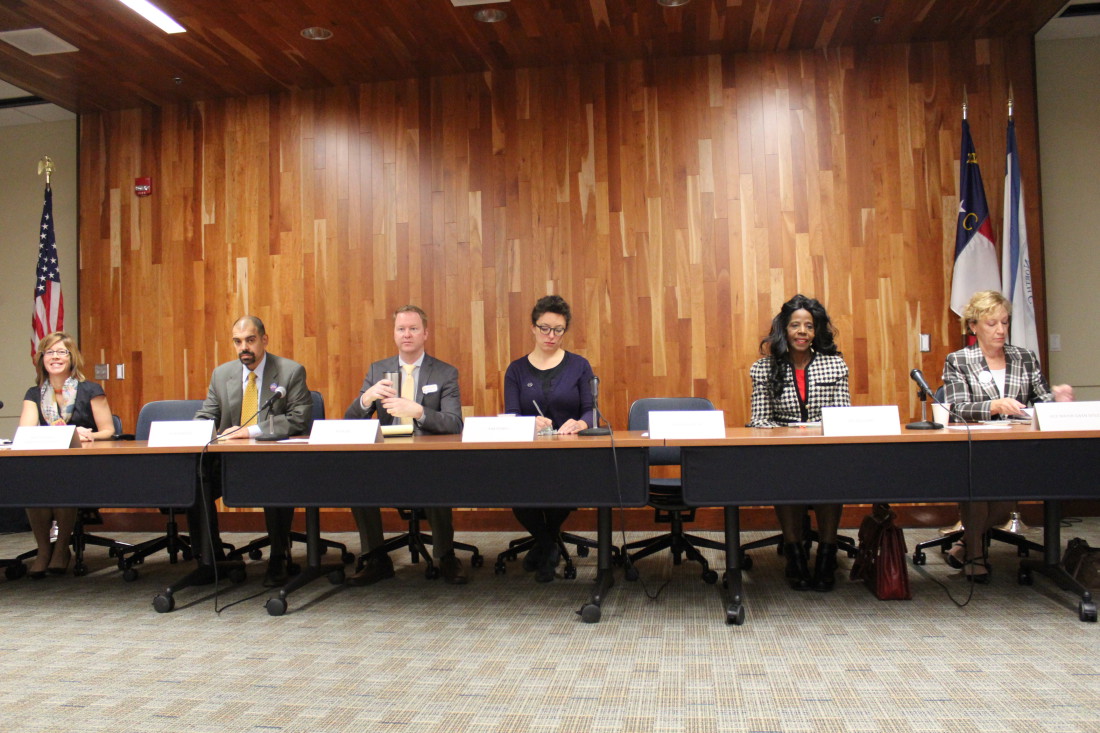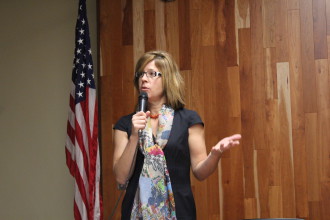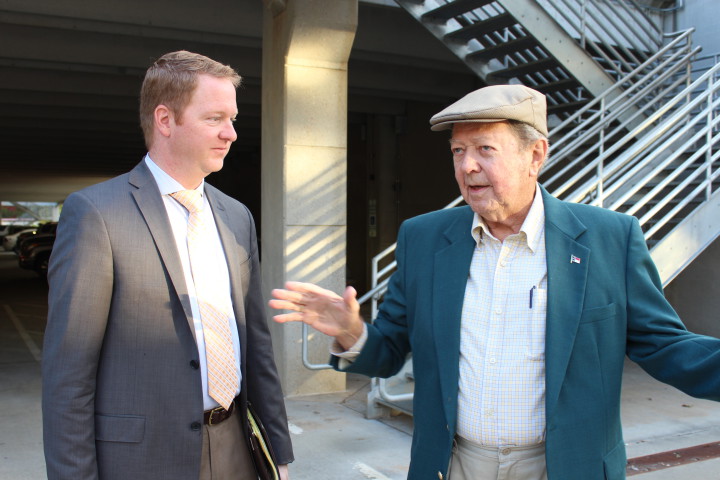Local political hopefuls (along with two incumbents) rolled out of bed early on Nov. 3 to participate in the final candidate forum of the 2017 election. At 7 a.m., with close to 30 similar events under their collective belts, five candidates for Asheville City Council and the city’s mayor looked a bit worn out by the exertions of the campaign season. Several said they were happy to see the light at the end of the tunnel with the Nov. 7 general election fast approaching.
Business and economic concerns topped the agenda, with candidates weighing in on the planned (and long-delayed) Interstate 26 connector project, law enforcement, stormwater, zoning, tourism and sanctuary cities. Empty chairs acknowledged mayoral challenger Martin Ramsey and Council candidate Sheneika Smith, who were not present. Mayor Esther Manheimer participated in a portion of the forum before leaving to attend a previously scheduled engagement.
At the end of the hourlong discussion — moderated by Buzzy Cannady of the hosting organization, the Council of Independent Business Owners — candidates expressed amazement that two hot-button issues, district elections for seats on the Council and short-term rentals, had not come up.
Hitting the road
Two of the event’s six questions focused on the I-26 connector. Responding to the first question, which explored candidates’ opinions about the consultant hired by the city to provide advice on the highway megaproject, Manheimer explained the genesis of the consulting contract. She said a “pretty contentious meeting in the Montford neighborhood not too long ago with the DOT and their consultants” showed the city that “we don’t have an expert on federal highway programs within the city.”
The consultants are in the early stages of their work and have yet to deliver their first analysis, Manheimer said.
“Most projects have a beginning and they have an end. The only thing we need to do is to insert measurables and benchmarks,” said Dee Williams. “And I guess there needs to be somebody running shotgun over the process, because it’s been going on for a really long time.” Later, she warned that the N.C. Department of Transportation would move on to another city if Asheville delays the project much longer.
Other candidates said they agreed with the need for the consultant. Vice Mayor Gwen Wisler, who participates in the I-26 working group on behalf of the city with the DOT, added, “My goal is, it needs to be the smallest footprint it can possibly be, and we need to have some of the real estate returned back to the city so we can actually develop around it.”
Cannady also asked whether candidates “favor further delays on the construction of the I-26 connector project, and what are those delays that you would favor?”

“There is no delay push coming from city or county government right now, and there hasn’t been for two or three years since Council and commission voted unanimously to approve the current design,” Rich Lee responded. The project has evolved from earlier design proposals, he said, and the changes have been for the better. “When I got involved in this as a neighbor about five or six years ago, it was on schedule to demolish about 500 businesses and private properties — houses — along Burton Street. Now we’re down to 200. If it’s delayed five years, maybe we’ll be down to zero.”
Kim Roney expressed disappointment that the Asheville Design Center’s proposal for a bilevel bridge wasn’t selected. That plan, she said, would “get the I-26 traffic from Tennessee to the growing port city of Charleston off of our local roads, and then have the one on top that would service the city. We would have moved forward really quickly with a lot of community support behind that.” Nevertheless, she continued,”Even DOT is recognizing there is an opportunity to save cost and impact, so we’re really close; let’s get it right.”
While she said she would accept delays to get critical portions of the project right, Wisler said, “We know that the Bowen Bridge is dangerous and something has to be done about it.”
The law won
Candidates showed deference to the independent functioning of law enforcement in response to Cannady’s question, “Do you favor directing the Asheville Police Department what laws to enforce?”

“I don’t think Council should be in the business of what laws to enforce or how to enforce it. That’s not our position,” responded Vijay Kapoor. “I think the important role is to make sure we have solid oversight on what is going on. We can’t just wash our hands of it.” As a former attorney, Kapoor said, the city could be liable in the case of “demonstrable impacts and discriminatory impacts on certain groups in the city.”
“Asheville is obviously a very progressive community,” said Manheimer. “It expects that we’re going to be on the cutting edge of how to do policing tomorrow, not yesterday. And to that end, the chief has really embraced that. She’s working with a group of community members that help inform her decision-making through her internal policy making, which we cannot control. I think she is doing a good job of blending support and transition and work with her department, and also bridging that with our community.”
Williams was the only candidate to discuss a specific constraint on police activity. “In terms of non-safety-related traffic stops,” she explained, “some of those are related to if you can keep a car up or not. One of the things that the national research tells us is that, a lot of these stops, particularly the poor people and people of color, result in deaths and injuries. One of the things we wanted to do, since our police department did not have data … [the NAACP is] working with the chief to send letters rather than the stops until we get more training done so that we can lessen injury.”
Roney highlighted a need to look at police salaries to improve officer retention. Wisler emphasized the department’s commitment to community policing, saying she voted for the new downtown policing unit to expand that capacity.
Stormy weather
Citing “tremendous stormwater problems in the city of Asheville,” Cannady asked candidates for their solutions.
“These issues are going to become more and more, whether you believe in climate change or not,” responded Wisler. “It’s true, it’s happening and Asheville needs to really plan and think ahead and think about resiliency as well as our need to make the city a little denser.”
Kapoor described a project he recently opposed on Overlook Road in South Asheville. “Some Greensboro developer wanted to clear-cut 25 acres of land on the side of a mountain to build almost a hundred homes. That would have had a huge stormwater impact over here. And truthfully, they may have been able to do that. The county pushed back and said they couldn’t get an erosion permit.” The near-miss, he said, highlights the need for rational and responsible development guidelines.

Williams emphasized green infrastructure as a more environmentally responsible and cost-effective approach to stormwater management, while Lee and Roney discussed the city’s aging stormwater infrastructure and the need for the city and the county to work together on stormwater issues.
Twilight zone
“The biggest issue we have with zoning is that it’s reactive instead of proactive,” declared Roney. “We’re the second-fastest gentrifying city in the country, according to Realtor.com, and that’s behind Charleston. Because it’s reactive and not proactive, we’re not seeing the kind of density that we need where our transit and infrastructure can handle it.” Addressing that shortcoming, she said, will require “having a big-picture idea and better measurables and better plans in our planning documents such as the Comprehensive Plan.”
Lee and Williams pointed out that increased density in residential areas isn’t leading to the creation of more affordable housing. “All you have to do is go down the road to West Asheville or Five Points and see that it’s not working,” Lee said. “You can take a 64th-of-an-acre lot and build a five-story house and sell it for a half-million dollars here.” Therefore, he concluded, “I don’t think the traditional approaches to get to affordable housing for the people that work here via zoning, I don’t see them working now.”
Calling land use and development “one of the biggest jobs that City Council has,” Wisler said she is pleased that during her tenure, Council has moved more development review back into its control. “And we’ve also asked that neighborhoods have a meeting with developers before an application is submitted,” she said. “So I think that that is extremely important, to make sure that the developers understand what the neighborhoods want before they actually apply to the city.”
In the end, Wisler continued, “It’s all about balance. It’s about, you want to retain your tree canopy, you want to increase density, you want to worry about stormwater, you have to worry about transportation. I’m really looking forward to the new Comprehensive Plan to hear what the citizens have said about this whole issue.”
From afar

On two questions dealing with those coming to the city from elsewhere — one addressing the role of tourism in the local economy, the other exploring thoughts on sanctuary city status — candidates expressed many of the same attitudes. Tourism was generally viewed as a vital and irreplaceable part of the local economy, but one that is subject to cyclical variations and that generally pays low wages. Candidates said they hope to diversify the region’s economy to reduce the dependence on tourism. Williams seemed to take the strongest stance, saying, “I do not favor more investment in tourism. Tourism is a low-hanging fruit.”
According to Wikipedia.com, a sanctuary city is one that “limits its cooperation with the national government effort to enforce immigration law.” All the candidates seemed to agree with the mayor, who said North Carolina law prohibits sanctuary cities. Therefore, said Manheimer, the issue is “a moot question.” Wisler said the city’s existing ordinance calling for Asheville to be welcoming and inclusive to all is the “strongest resolution we can do under the law.”






Before you comment
The comments section is here to provide a platform for civil dialogue on the issues we face together as a local community. Xpress is committed to offering this platform for all voices, but when the tone of the discussion gets nasty or strays off topic, we believe many people choose not to participate. Xpress editors are determined to moderate comments to ensure a constructive interchange is maintained. All comments judged not to be in keeping with the spirit of civil discourse will be removed and repeat violators will be banned. See here for our terms of service. Thank you for being part of this effort to promote respectful discussion.